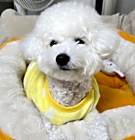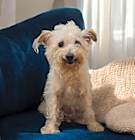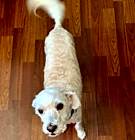Bichon Frises are small-sized dogs. Adult Bichon Frises are usually 9 to 11 inches tall and weigh between six and 16 pounds. Individual Bichon Frises might vary slightly in size, and some may be slightly smaller or larger than the breed standard range.
Bichon Frise
Breed Type: Non-Sporting
Common nicknames: Bichon, Tenerife Dog
Coat: Curly, double
Hypoallergenic: Yes, they may not trigger allergies.
Temperament: Affectionate, friendly, playful, patient
Life expectancy: 12-15 years
Color & patterns: White

The Bichon Frise is a small and charming breed sure to melt your heart. Despite their small size, they have big personalities filled with affection, playfulness, and intelligence. They are great family pets, known for their adaptability and friendly nature, making them a delightful addition to any home. Their fluffy, white hypoallergenic coats also make them a perfect choice for those with allergies. If you’re looking for a dog who will bring sunshine into your life, the Bichon Frise is the one for you.
Bichon Frise characteristics
Learn about about Bichon Frise basics like their fur colors, shedding levels, how much grooming they need, and other Bichon Frise facts.
Average height
9-11 inches (22.9-27.9cm)
Average weight
6-16 pounds (2.7-7.3 kg)
Average lifespan
12-15 years
Exercise needs
Grooming needs
Full-grown size
Good with cats
Good with kids
Training aptitude
Do Bichon Frises shed?
No, the Bichon Frise is a low-shedding breed that produces minimal dander, making Bichons more tolerable for some allergy sufferers. Instead of shedding like other breeds, Bichon Frises have a continuously growing, curly coat that requires regular brushing and professional grooming. While no dog breed is completely hypoallergenic, Bichon Frises comes pretty close. But their thick, silky coats will either require regular clipping to keep it soft and easily maintained, or daily brushing to ensure it doesn't become matted.
Are Bichon Frises double coated?
No, Bichon Frises are not double-coated dogs. They have a single-layered, curly coat that is hypoallergenic and sheds minimally. The Bichon Frise’s soft, dense, continuously growing coat needs regular grooming to prevent matting, tangling, and skin issues.
Are all Bichon Frises dogs white?
Yes, all Bichon Frise dogs should be white, though shadings of buff, cream, or apricot are acceptable around the ears or on the body as long as the color does not exceed 10 percent of the entire coat.
Is a Bichon Frise a Poodle?
No, a Bichon Frise is not a Poodle. The Bichon Frise and the Poodle are distinct breeds with their own unique characteristics, history, and breed standards, although they do share some similarities in terms of appearance, especially when both breeds are groomed in a similar style.
How long do Bichon Frises live?
Bichon Frises have an average lifespan of 14 to 15 years. However, individual lifespans can vary based on factors such as genetics, diet, exercise, healthcare, and overall lifestyle. Providing proper care, regular veterinary check-ups, a balanced diet, and maintaining a healthy weight can contribute to helping dogs of all breeds live long and healthy lives.
When is a Bichon Frise full grown?
A Bichon Frise is fully grown between the ages of 12 to 15 months. However, some Bichons continue to fill out and develop their adult coat until they are around 18 months to two years old.
How do you pronounce Bichon Frise?
The breed name Bichon Frise is pronounced as “BEE-shon Free-ZAY.”
Bichon Frise history
Learn about where this Bichon Frise came from!
What were Bichon Frises bred for?
The Bichon Frise was originally bred for companionship. This small, cheerful, and affectionate breed originated in the Mediterranean region and was a favorite among European nobility and royalty during the Renaissance period. Bichon Frises also have a history of being used as circus dogs due to their intelligence, trainability, and lively personality.
Where are Bichon Frises from?
The Bichon Frise is derived from the Barbet, a curly-coated water dog. In the 1300s, Spanish and Italian sailors used them as barter items on their voyages. In the 16th-century French Renaissance, they enjoyed a new status as the devoted lap dogs of French royalty.
Bichon Frise temperament
Learn about about the Bichon Frise temperament and how well they fit into your lifestyle, home environment, and family.
Are Bichon Frises good with kids?
Yes, most Bichon Frises are good with kids and make wonderful family pets. Bichon Frises are typically gentle and patient dogs that can tolerate the playful and sometimes unpredictable behavior of children. They enjoy playing games, running around, and engaging in interactive activities with kids.
As with any breed, it’s important to teach children how to properly and respectfully interact with dogs, for pet parents to teach their dogs how to interact gently with children, and for interactions between Bichon Frises and children to be supervised to ensure safety.
Are Bichon Frises aggressive?
No, Bichon Frises are not aggressive dogs. They are typically friendly, sociable, and affectionate companions who enjoy interacting with people and other animals.
However, individual temperament, behavior, and experiences can vary. Some Bichon Frises might exhibit aggressive tendencies under certain circumstances or if they feel threatened, fearful, or stressed. A lack of socialization can contribute to fear, insecurity, and potential aggression in Bichon Frises. Pain, illness, or underlying health conditions can also contribute to changes in behavior, discomfort, and potential aggression in Bichon Frises.
Are Bichon Frises easy to train?
Yes, Bichon Frises are easy to train compared to some other breeds. Bichon Frises are smart dogs who quickly pick up on cues, commands, and routines. Their intelligence and ability to learn can make training sessions more productive and successful; they have even been used to herd sheep. Bichon Frises are also eager to please their pet parents and enjoy receiving praise, rewards, and positive reinforcement during training sessions.
However, training any dog takes substantial time and effort, regardless of breed, and each dog is an individual, so not all Bichon Frises are easy to train. Some might be more stubborn, independent, or distractible, which can require additional time, patience, and creativity to overcome training challenges.
Are Bichon Frises good dogs?
Yes, Bichon Frises are good dogs. They are small, cheerful, affectionate, and social dogs who make wonderful companions for individuals and families alike. The Bichon Frise is known for its loving and devoted nature, playful personality, trainability, and adaptability to various living environments.
Are Bichon Frises good with cats?
Yes, most Bichon Frises are good with cats, especially if they are introduced and socialized to cats at a young age. Bichon Frises and cats can coexist peacefully and even form strong bonds and friendships in the same household. However, individual personality and previous experiences can influence the relationship between a Bichon Frise and a cat. Some Bichon Frises might have a higher prey drive or be more curious or playful toward cats, so it’s essential to supervise interactions and intervene if necessary.
If you’re considering adding a Bichon Frise to a household with cats, or if you already have a Bichon Frise and a cat and want to improve their relationship, consult with a veterinarian, dog trainer, or behaviorist for personalized advice, guidance, and support.
Are Bichon Frises good with other dogs?
Yes, most Bichon Frises are good with other dogs. When properly socialized and introduced, Bichons usually enjoy the company of other dogs and can engage in playful interactions, form friendships, and live peacefully in multi-dog households. They tolerate and adapt to the play styles and behaviors of other dogs and establish respectful and balanced relationships. Some Bichon Frises might be more reserved, shy, or selective in their interactions with other dogs, so always introduce dogs slowly and supervise them.
Are Bichon Frises smart?
Yes, Bichon Frises are smart dogs. They are quick learners, eager to please, and capable of understanding and following commands, cues, and routines when properly trained and socialized. Bichon Frises demonstrate problem-solving abilities, adaptability, and a keen awareness of their surroundings. Their curiosity, adaptability, and ability to think critically allow them to effectively navigate different situations and environments.
Are Bichon Frises affectionate?
Yes, Bichon Frises are affectionate and loving dogs. They are devoted companions who enjoy being close to their people, cuddling, and showing affection through physical contact, such as licking, nuzzling, and sitting on laps. Bichon Frises are generally social, friendly, and eager to please, but individual temperament, personality, and experiences can influence their behavior and interactions. Some Bichon Frises may be more reserved, shy, or independent, while others may be more outgoing, playful, and expressive in their affection.
Are Bichon Frises good for first-time pet parents?
Yes, Bichon Frises are good for first-time pet parents due to their friendly, affectionate, and adaptable nature. They are generally easy to train, eager to please, and enjoy being part of a family. Their small size and moderate activity level make them a convenient and manageable option for first-time pet parents.
Bichon Frises have a curly, hypoallergenic coat that does not shed much but requires regular brushing and first-time pet parents need to invest time and effort in learning proper grooming techniques and establishing a grooming routine.
Do Bichon Frises bark a lot?
No, Bichon Frises are not usually excessive barkers or yappers. They are alert and vocal dogs, however, and might bark to alert their pet parents of strangers or unusual sounds, express excitement, or communicate their needs and desires.
Some Bichon Frises are more vocal than others depending on their personality, environment, and upbringing. Proper training, socialization, and positive reinforcement techniques can teach Bichon Frises when it’s appropriate to bark and when to be quiet.
Are Bichon Frises good therapy dogs?
Yes, Bichon Frises are good therapy dogs due to their friendly, affectionate, and gentle nature. Bichon Frises enjoy giving and receiving attention, cuddling, and providing comfort to people, which can help reduce stress, anxiety, and feelings of loneliness. The Bichon’s patience, attentiveness, and ability to remain calm in various situations are valuable traits for therapy work. Their eagerness to please, quick learning abilities, obedience, and adaptability to new environments and routines contribute to their success as therapy dogs.
Bichon Frise health
Learn about about the Bichon Frise health outlook and what diseases they may be prone to at various stages of their life.
Do Bichon Frises have health problems?
Bichon Frises are generally healthy dogs, but like all breeds, they are prone to certain health issues. Potential health problems that can affect Bichon Frises include:
Hip dysplasia: Although less common in Bichon Frises compared to larger breeds, hip dysplasia can still occur and cause mobility issues and discomfort. Screening, monitoring, and managing hip dysplasia through proper nutrition, weight management, exercise, and veterinary care can help maintain their hip health and mobility.
Patellar luxation: This is a condition where the kneecap (patella) can slip out of place, causing lameness or discomfort. Regular veterinary checkups can help detect and manage patellar luxation if present.
Legg-Calve-Perthes: This is a condition that causes the head of the femur (located in a dog’s hind leg) to spontaneously degenerate. Over time, this will lead to erosion of the hip joint and arthritis. A Bichon Frise suffering from Legg-Calve-Perthes will become lame, limp while walking, and experience pain when moving the hip joint. Surgery is the most effective treatment for the disorder.
Eye conditions: Bichon Frises are prone to certain eye conditions, including cataracts, progressive retinal atrophy (PRA), and dry eye (keratoconjunctivitis sicca). Regular eye examinations, monitoring for signs of eye problems, and early detection and treatment can help preserve vision and eye health.
Bladder stones: Bichon Frises are prone to developing bladder stones, which can cause urinary issues and discomfort. Proper diet, hydration, and regular veterinary care are essential for prevention and treatment.
Allergies: Bichon Frises are susceptible to allergies, including skin allergies, food allergies, and environmental allergies (e.g., pollen, dust, and mold). Allergies can cause itching, skin irritation, ear infections, and other health issues. Identifying and addressing the underlying cause of allergies through veterinary examination, testing, and treatment can help manage and alleviate symptoms.
Dental issues: Dental problems, such as tartar buildup, gum disease, and tooth decay, can affect Bichon Frises. Regular dental care — including brushing their teeth, providing dental chews or toys, and scheduling professional dental cleanings with a veterinarian — can help maintain their oral health and prevent dental issues.
Ear infections: Bichon Frises have floppy ears that can trap moisture, dirt, and debris, making them more susceptible to ear infections. Regular ear cleaning and inspection can help prevent and manage ear infections and maintain ear health.
Are Bichon Frise hypoallergenic?
Yes, Bichon Frises are considered hypoallergenic dogs. Their single-layered, curly coat does not shed excessively and grows continuously, like human hair, which reduces the amount of dander and allergens that are released into the environment.
However, no dog breed is 100 percent hypoallergenic. Bichon Frises produce fewer allergens than many other breeds, but they still produce some dander, saliva, and urine, which can potentially trigger allergic reactions in sensitive individuals. If you or someone in your household has allergies and you’re considering getting a Bichon Frise, spend some time with adult Bichons first to see if you have an allergic reaction.
Do Bichon Frise lose their teeth?
Yes, some Bichon Frise lose their teeth earlier than other breeds, starting at around seven years old. Genetics is partly to blame for early tooth loss, but poor dental hygiene can make things worse. Monitor your Bichon Frise’s teeth and gums throughout their life. If you notice any signs of dental issues, such as broken or loose teeth, swollen or bleeding gums, bad breath, or changes in chewing or eating habits, consult with a veterinarian.
Do Bichon Frises need a lot of exercise?
No, Bichon Frises have a moderate energy level and do not require a lot of vigorous exercise compared to some other breeds. However, they still need daily physical activity, mental stimulation, and enrichment to stay healthy, happy, and well-balanced. Aim for at least 30 minutes to one hour of exercise per day for your Bichon Frise.
Popular Bichon Frise mixes
A few common Bichon Frise mixes include:
Bichomo (Bichon Frise + American Eskimo)
Chi-Chon (Bichon Frise + Chihuahua)
Chinese Frise (Bichon Frise + Chinese Crested)
Cock-A-Chon (Bichon Frise + Cocker Spaniel)

Find Bichon Frise puppies near you
Adopting a Bichon Frise
Learn about acquiring a Bichon Frise - the pros and cons of adopting versus going through a breeder, and associated costs.

Nana
Bichon Frise
Female, 1 yr 9 mos
Beverly Hills, CA
Not good with dogs
Not good with cats
Needs experienced adopter
House-trained
Spayed or Neutered
Shots are up-to-date

Hope
Bichon Frise Yorkie, Yorkshire Terrier
Female, 7 yrs
Los Angeles, CA
Good with dogs
Not good with cats
House-trained
Spayed or Neutered
Shots are up-to-date

JENNY-Help Needed
Bichon Frise Poodle (Miniature)
Female, 8 yrs 3 mos
Los Angeles, CA
Good with dogs
Not good with cats
Needs special attention
House-trained
Spayed or Neutered
Shots are up-to-date

Hey
Bichon Frise Poodle (Standard)
Female, young
LA, CA
Good with dogs
Not good with cats
House-trained
Spayed or Neutered
Shots are up-to-date

Stella
Bichon Frise Poodle (Miniature)
Female, senior
Playa Vista, CA
Good with dogs
Not good with cats
House-trained
Spayed or Neutered


COCO
Bichon Frise
Male, 1 yr
BELL GARDENS, CA
Good with dogs
Not good with cats
House-trained
Spayed or Neutered
Shots are up-to-date

Bichon Frise
Female, 8 yrs 2 mos
Torrance, CA
Good with dogs
Good with cats
House-trained
Spayed or Neutered
Shots are up-to-date

MIRO
Bichon Frise Toy Poodle
Male, young
Agoura Hills, CA
Good with dogs
Good with cats
House-trained
Spayed or Neutered

Nana
Bichon Frise
Female, 1 yr 9 mos
Beverly Hills, CA
Not good with dogs
Not good with cats
Needs experienced adopter
House-trained
Spayed or Neutered
Shots are up-to-date

Hope
Bichon Frise Yorkie, Yorkshire Terrier
Female, 7 yrs
Los Angeles, CA
Good with dogs
Not good with cats
House-trained
Spayed or Neutered
Shots are up-to-date

JENNY-Help Needed
Bichon Frise Poodle (Miniature)
Female, 8 yrs 3 mos
Los Angeles, CA
Good with dogs
Not good with cats
Needs special attention
House-trained
Spayed or Neutered
Shots are up-to-date

Hey
Bichon Frise Poodle (Standard)
Female, young
LA, CA
Good with dogs
Not good with cats
House-trained
Spayed or Neutered
Shots are up-to-date

Stella
Bichon Frise Poodle (Miniature)
Female, senior
Playa Vista, CA
Good with dogs
Not good with cats
House-trained
Spayed or Neutered


COCO
Bichon Frise
Male, 1 yr
BELL GARDENS, CA
Good with dogs
Not good with cats
House-trained
Spayed or Neutered
Shots are up-to-date






